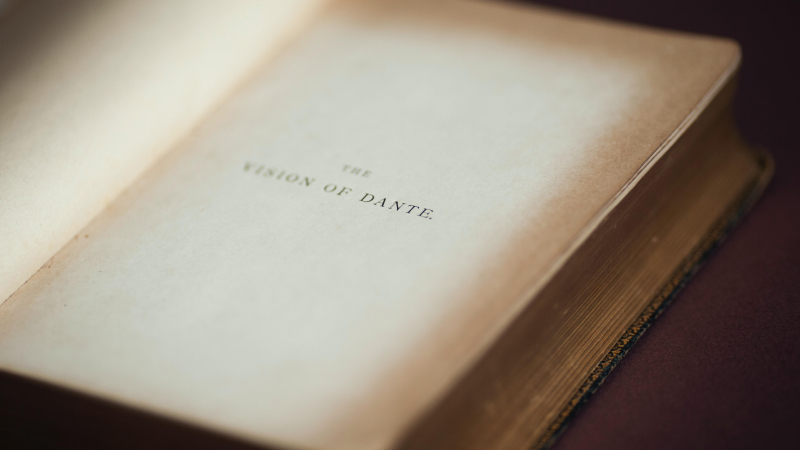The “Arrogance” of Greatness: Dante, Milton, and Muhammed Ali

My dad is nothing like Muhammed Ali. Still, as a very little boy, I loved watching sports with my dad. One day, probably watching Friday Night Fights, I remember watching some reporter, maybe Howard Cosell, interviewing Muhammed Ali. As a child, I was dumb-struck. I had never seen anyone as audacious, as loud, and as proud as Ali. I remember my desire to commiserate with my dad. I was sure that I knew what dad was thinking. I began the conversation shaking my head saying, “What a bragger!” My dad, looked over at me, and quietly quoted Dizzy Dean, “It’s not bragging if you can do it.” I was agape. How could this be. Why would my dad, my humble, sacrificial, Christian dad defend this braggadocios, prideful, arrogant boxer? Since then I followed Ali because I was trying to solve this mystery. Eventually, I came to see why my dad had such respect for Ali. He respected him because my father recognized his greatness.
As we read the Great Books, we come into contact with greatness. At times, the greatness is self-conscious. It is less brash than Ali, but actually, in the scope of things, these authors are claiming much more than Ali every could. In this post I wanted to give you two examples of this “arrogance” and how it can be useful as train student to recognize greatness and discern the difference between sinful, prideful arrogance, and true greatness making a righteous self-assessment.
Dante in Limbo
In Canto IV of Inferno, Dante is in limbo. In Catholic theology, limbo is a place where virtuous or innocent people who never knew saving grace spend eternity outside the presence of God. Unlike all others in Hell, they are not punished but also, they are never able to see God. Basically, it is like an eternal pause or detention where you stand around and talk. In this place, Dante finds a circle of great poets. He is being led by Virgil, who had come from limbo to the world of the living to rescue Dante. In the circle, he also finds Homer, Ovid, Horace, and Lucan. Interestingly, Dante takes his place in the circle and enters into the conversation. Dante is more subtle than Ali, but what he is announcing is that he belongs in the circle. He is great like these other poets. Now, this doesn’t make much impact on us now because we know 700 later that Dante does belong in that circle of greatness. He knew it and announced it, however, then.
He claims greatness, greatness that rivals Homer and Virgil, as he publishes The Comedy. One can only imagine the impact that this made on people in his day. I am sure that many had to react by saying, “Who does this fool think that he is!” Yet, Dante’s judgment has been confirmed by history. In the Basilica of Santa Croce (Holy Cross) in Florence is a vast memorial for many famous Italians. It is the actually burial place of many famous Florentines. Michelangelo’s area looks like a coffee kiosk next to the gigantic tomb prepared for Dante’s body. Of course, the poet’s remains aren’t even in the church. He died in exile and he is buried in Ravenna. Each year Florence asks Ravenna for the return of Dante’s body. Here is a recent story from Italy Magazine on the nearly 700-year dispute. To make the point more emphatic there is a giant statue of Dante overlooking the piazza outside the Basilica.
Milton
Another example of self-conscious greatness is John Milton. Intellectually and educationally, Milton was without peer. He spent the better part of a decade reading everything in the libraries of England and Europe, after completing his studies at Cambridge. By the end of this time, he had read almost everything of importance available in the Western world’s libraries. He then dove into politics, writing pamphlets supporting the Puritan side during the English Civil War. By the time he was old man, he had angered many of his friends and when his enemies recaptured the throne, he was jailed. Ultimately, he was released because his friends claimed that he was old, infirm, broken blind man who could do no harm to anyone. (Milton ended his life much more like Ali whose wit and athletic grace were broken by Parkinson’s Disease.) As he was released, he began to write Paradise Lost. The first lines of Paradise Lost unveils Milton’s assessment of his work (Paradise Lost I.1-26). In them, he claims:
- That he is better than the other poets because the Heavenly Muse, the Holy Spirit, is going to speak through him.
- That he is going to soar over the old poets led by the weaker old pagan muses.
- That he will be able to justify the ways of God to man.
Now, that is a mouthful. I have spent many hours talking with students about whether Milton accomplished all that he claims. One thing was clear from the beginning, he claims a lot. Now, another is clear, he was right about the greatness of his work. It belongs amongst the greatest poetic efforts of history.
Biblical Examples of Self-Conscious Greatness
There are also biblical examples of this sort of honesty about greatness. My favorite Old Testament example of this is Moses’s humility mentioned in Numbers 12:3, which state, “Now Moses was a very humble man, more humble than anyone else on the face of the earth.” It is possible that this was penned by Moses’s amanuensis, likely Joshua, but Moses is the author. It is hard to think that Joshua tried to sneak this by Moses. More importantly, it’s true. Moses who stood before the face of God plead for the lives of his enemies, trusted God in the face of great trials, and was used mightily by the Lord.
In the New Testament, Jesus is the prime example of this. He says things like, ““Very truly I tell you,” Jesus answered, “before Abraham was born, I am!” (John 8:58). We would like a Jesus who played more Uriah Heep Humble avoiding ruffling feathers. Instead we get a Jesus who claims exclusivity (no one comes to the Father except through me), a Jesus who welcomes worship, and a Jesus who claims kingship.
Why is this important
These passages and others like them are places where we need to train students to judge truth claims rather than tone or feeling. When Aragorn in the Lord of the Rings books not only claims kingship, but longs to be ruling, Tolkien catches this biblical note clearly. This is so unsavory to modern audiences that Peter Jackson completely transforms the Aragorn of the films making him someone who is trying hard not be king.
Our culture is going to attempt to make all claims of greatness into arrogant rejections of equality, or prideful claims of advantage. They are not. God gives liberally to all believers and all humans. He gives incredible gifts to some. He gave courage to David. He gave wisdom to Solomon. He gave intellect to Dante, Milton, and Homer. He gave athletic grace to Ali. He gave us a Son, His Son, who is not our equal. He has no need to convince us of His greatness. We owe Him our obedience and allegiance. We also need to see, recognize, and prayerfully strive for greatness in what we do. Our students need to make judgments wisely rather than meekly lying and failing to recognize greatness when God has lavished it on someone.






